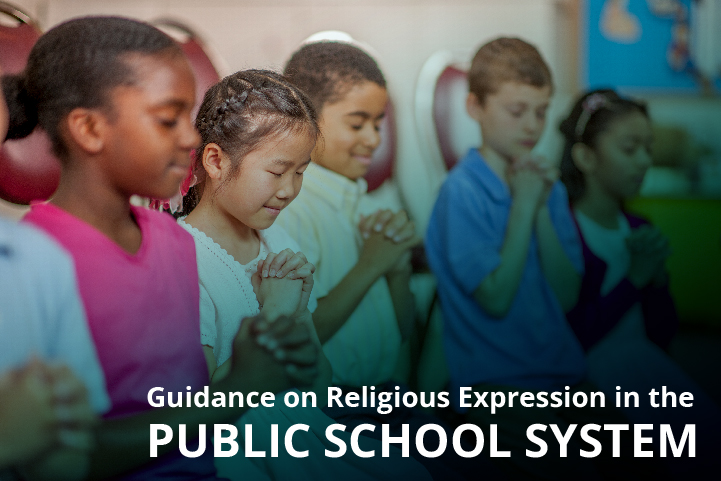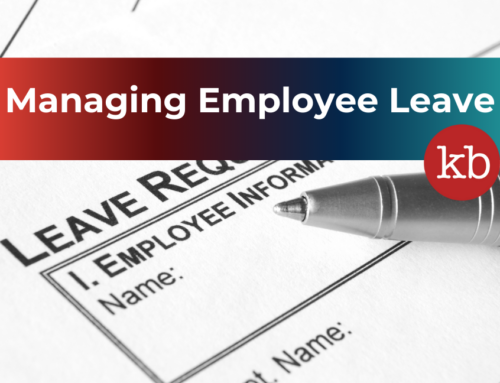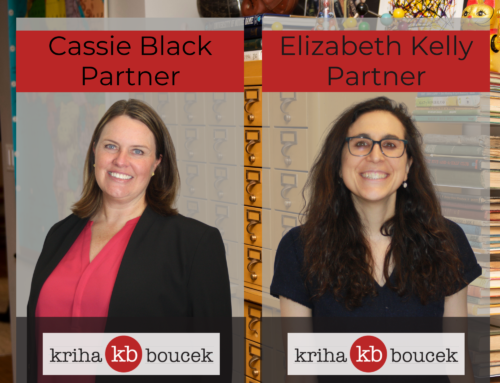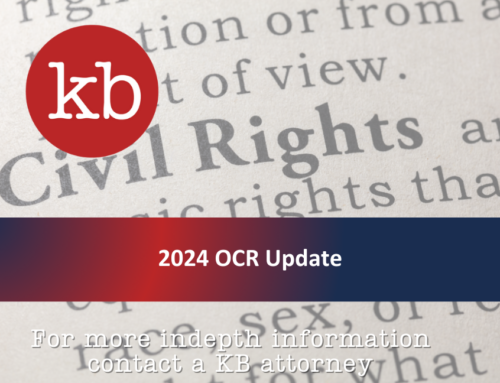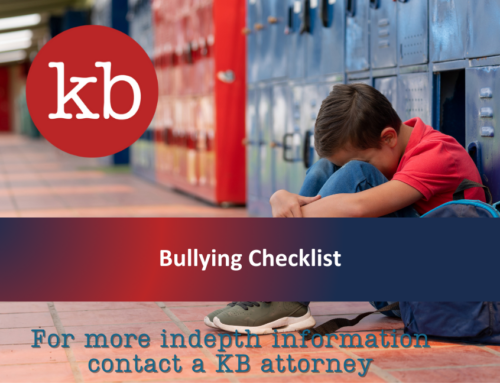By: Elizabeth Kelly
On May 15, 2023, the U.S. Department of Education released guidance on the current state of the law as it relates to school prayer and religious expression in the public school setting. This guidance comes on the heels of the U.S. Supreme Court decision in Kennedy v. Bremerton.
The legal motivation for the Department of Education to issue this guidance comes from Section 8524(a) of the Elementary and Secondary Education Act of 1965 (ESEA), as amended by the Every Student Succeeds Act (20 U.S.C. § 7904(a)). Under Section 8524(a) of the ESEA, the Secretary of Education is required to issue guidance to SEAs and LEAs, as well as the general public, on constitutionally protected prayer in public elementary and secondary schools. Further, under Section 8524(b), as a condition of receiving ESEA funds, an LEA is required to annually certify in writing to its SEA that it has no policy that prevents, or otherwise denies participation in, constitutionally protected prayer in public elementary and secondary schools. This latest guidance issued by the U.S. Department of Education is intended to assist LEAs in reviewing their policies in order to remain compliant with Constitutionally protected rights.
In Kennedy v. Bremerton, the U.S. Supreme Court ruled that a public school district could not restrain a high school football coach from engaging in a “brief, quiet, personal religious observance” on the field after football games. (Kennedy v. Bremerton School District, 142 S. Ct.2407, 2433 (2022)). In response to this decision, schools have been unclear on when and where prayer by school personnel or students at school is permitted. To assist schools in applying the ruling in this recent Supreme Court decision, the U.S. Department of Education addressed eight (8) different scenarios involving prayer at school and school events and provided guidance for schools related to each scenario. Additionally, the Department of Education provided guidance related to public schools’ handling of other forms of religious expression, beyond prayer, in the public school setting. Together, the analysis of these scenarios provides helpful guidance for public schools on how best to respond to requests or questions about student and staff religious expression and practice in the public school setting.
Below, we outline the general guidance provided by the U.S. Department of Education.
Key Constitutional Principles Regarding Prayer in Connection with the Public School Setting
1. Prayer and Religious Exercise During Non-Instructional Time:
When not engaged in school instruction or activities, students shall be permitted to pray or engage in other forms of religious worship or study, so long as doing so does not materially disrupt the educational program. Restrictions can be placed on student activities during these times, but such restrictions cannot discriminate – facially or in practice – against student prayer or religious practices.
For example, schools may prohibit students from actively engaging in a group prayer circle during instructional time, just as a school would prohibit students from actively engaging in a classroom discussion on any subject during classroom instructional time. However, if a student wishes to pray in the hallway before or after school, or during other non-instructional times, they should be permitted to do so.
2. Organized Prayer Groups and Activities:
Student religious clubs and/or prayer groups should be permitted to form and meet to the same extent that other non-curricular, secular student groups and clubs are permitted to form and meet. Such groups shall be permitted the same access to school facilities for meeting as other non-curricular student groups, and requests to advertise or promote the group shall be treated the same as other non-school related groups.
School officials should not encourage or discourage participation in such groups, and schools are permitted to take the steps necessary to ensure that students who prefer not to participate in such groups do not feel pressured to do so.
Recall that schools in Illinois should have a Board Policy addressing equal access to school facilities for non-school-sponsored student groups. This policy should be reviewed to confirm that it does not give preference to religious or non-religious groups but rather applies uniformly to all student groups.
3. Teachers, School Administrators, and Other School Employees:
Public school employees are not prohibited from engaging in private prayer during the workday, so long as they are not doing so as part of their official capacity as public school employees and so long as their prayer does not result in the coercion of students. During non-working hours, such as before or after school or during break times, employees may meet with other employees to engage in prayer or religious expression to the same extent they would be permitted to do if they were engaged in non-religious activities or expression with one another.
Schools are permitted to take reasonable steps to ensure students are not pressured or encouraged to join in any private prayer expression of staff.
4. Moments of Silence:
Quiet periods or moments of silence held during a school day may be used for students to engage in silent prayer if they wish to do so. Students shall neither be encouraged nor discouraged from prayer during these times.
5. Accommodating Prayer and Religious Exercise During Instructional Time:
Students may engage in prayer during instructional time to the extent they are permitted to engage in other non-religious, private expressions at the time. For example, a student should be permitted to pray at their desk prior to taking an exam, so long as they are not doing so in a manner that disrupts other students.
6. Student Assemblies and Non-Curricular Events:
Students selected to speak at non-curricular events and school assemblies cannot be selected based upon their preference or disfavor of any religious perspective. Selection should be based on “genuinely content-neutral, evenhanded criteria.” When students are selected to speak based on such criteria and the school has no control over the content of the student’s speech and the student’s expression is not reasonably attributed to the school, the school cannot restrict the speech simply because it has religious content or includes prayer. For example, if a student is selected to speak at an extracurricular event’s end-of-the-year banquet, and the school and school officials have no control or authority over what the speech will include, the student may include religious reference or prayer. However, in cases where the school has control over the speech or is in a position to determine the content of what is expressed, the speech is sufficiently attributable to the school and may not include prayer or content promoting or opposing religion.
7. Graduation:
Similar to student speeches at assemblies or non-curricular events, where a student or selected graduation speaker is selected based on “genuinely content-neutral, even-handed criteria.” The school has no control over the content of the speech nor determines what the speaker will/can say; and if the speech is not reasonably attributable to the school, the speech may include prayer or content promoting or opposing religion. However, schools cannot mandate or organize prayer at graduation ceremonies, nor shall they select graduation speakers in a manner that favors religion generally or one religion over another. Where schools have no control or determination power over the content of graduation speeches, schools can consider making appropriate, neutral disclaimers to clarify that the speech is the speaker’s speech — not the school’s.
8. Baccalaureate Ceremonies:
Baccalaureate ceremonies or similar religious ceremonies cannot be mandated by schools. If, however, a school permits its facilities to be used by other private, non-religious groups, the school should make its facility available for the private baccalaureate ceremony on the same terms and conditions as applied to non-religious groups seeking the use of school facilities. Schools are further permitted to disclaim sponsorship or approval of baccalaureate or other religious events held on campus (or elsewhere) by private groups, so long as in doing so, it does not favor/disfavor groups meeting for purposes of engaging in religious prayer or speech.
School personnel are permitted to attend baccalaureate ceremonies in their personal capacities.
Key Constitutional Principles Regarding Religious Expression Outside of Prayer in the Public School Setting
1. Religious Literature:
Students are permitted to distribute religious literature at school and to their classmates consistent with the same terms and conditions applied to students wishing to distribute non-religious texts. The same reasonable time, place, and manner rules should apply regardless of the literature being distributed. For example, a school may have a rule prohibiting students from distributing flyers or informational pamphlets about non-school-related events during instructional time but permitting students to distribute such during lunch or in the hallways before and after school. This same time, place, and manner rule should be applied to students seeking to distribute religious texts.
Many schools in Illinois have various Board Policies addressing the distribution of non-school-sponsored materials, which may apply to students, staff, and community members. These policies should be reviewed to ensure treatment of religious texts is consistent with the treatment of non-religious texts.
2. Teaching About Religion:
Religious instruction in public schools is not permitted; however, schools may teach about religion and its impact and role in history, literature, art, philosophy, and culture –among other areas. Relatedly, public schools may allow students in the choir or band to perform music that has religious themes or is based on religious events (i.e., Christmas music); however, the performance of such cannot be used as a way to promote or discourage religion or a particular faith, nor can it be done as part of a religious exercise. Further, schools may celebrate secular aspects of holidays and recognize and teach about the religious aspect of a holiday — but schools may not promote or disparage the observance of such holidays.
3. Student Dress Codes and Policies:
School dress codes and uniforms are permissible to the extent they do not interfere with a student’s civil rights. Exceptions to a dress code should be applied consistently to both religious and non-religious clothing accommodation requests.
Religious messages can be displayed on student clothing in accordance with the same rules applied generally to messages or text being displayed on clothing. For example, if a dress code prohibits all messages on clothes, except for the name of the school, then a student can be prohibited from wearing a bible verse on their shirt. Alternatively, a dress code cannot permit the lyrics of a song to be displayed on a shirt but prohibit a passage from the Quran.
4. Religious Expression in Class Assignments and Homework:
Students should be permitted to express religious beliefs in their schoolwork, including writings, artwork, and other written or oral assignments. Classwork and assignments should be graded in accordance with the academic standards and principles being applied — not on the religious (or lack of religious) account being portrayed or expressed.
5. Excusal for Religious Activities:
Public schools can allow students to leave school for purposes of attending non-public school classes or religious instruction, providing students who do so are not discouraged from the practice and are not penalized for attending such. Relatedly, students choosing not to participate in such should not be penalized or encouraged to do so.
Where students request permission to leave class to remove a burden on their religious practice, such as for prayer or religious fasting, they should be permitted to do so, provided doing so does not impose a material burden on their classmates. In situations where schools have a tradition and established practice of excusing students from class to accommodate non-religious needs, religious-based excusals should not be treated less favorably.
Finally, recall that State laws place additional requirements on schools related to student and staff religious excusals. For staff, schools are required to grant a staff member’s request for time off to observe a religious holiday, so long as their absence will not cause an undue hardship on the school. Collective bargaining agreements may require more. Students shall be excused from school for religious reasons, including observing religious holidays, attending religious instruction, or accommodating a religious objection to secular activities on particular days or at particular times. Students must be provided an opportunity to make up any tests or assignments they missed as a result of such absence.
Contact a Kriha Boucek attorney to discuss how the latest guidance from the U.S. Department of Education on prayer and religious expression impacts your district.

